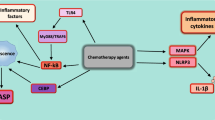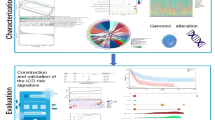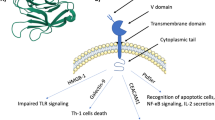Abstract
Natural killer (NK) cells, a predominant innate lymphocyte subset, mediates eradicating malignant cells. Purinergic signaling by ectonucleotidase CD39 can suppress T-cell response in caner. However, the role of CD39 in NK cells has not been fully elucidated. Here, we characterized CD39 expression on NK cells and its clinical relevance in esophageal squamous cell carcinoma (ESCC). Peripheral blood and tissue samples were collected from 36 ESCC patients. We observed that the proportion of NK cells significantly decreased but CD39 was obviously up-regulated on NK cells from cancerous tissues compared to paired peripheral blood in ESCC patients. Furthermore, tumor-infiltrating NK cells with high CD39 expression exhibited a phenotype of functional impairment. In vitro, conditioned media of ESCC cell lines could induce CD39 expression on peripheral NK cells from healthy donors. IL-6 was identified as the major cytokine produced by ESCC cell lines and also elevated in both tumor tissues and blood serum from ESCC patients. Recombinant IL-6 significantly induced surface CD39 expression in human NK cells, while IL-6-receptor antagonist tocilizumab prevented this effect. Finally, tumor-infiltrating CD39+ NK cells were correlated with poor prognosis in ESCC patients. Thus, tumor-derived IL-6 might impair NK cell functions through induction of CD39 expression. CD39+ NK cells may serve as a potential prognostic biomarker for ESCC patients.






Similar content being viewed by others
Abbreviations
- CM:
-
Conditioned media
- ESCC:
-
Esophageal squamous cell carcinoma
- NK:
-
Natural killer
- PBMC:
-
Peripheral blood mononuclear cells
- PD-1:
-
Programmed death 1
- PD-L1:
-
Programmed death ligand 1
- PMA:
-
Phorbol 12-myristate 13-acetate
- TIGIT:
-
T cell immunoglobulin and ITIM domain
- TIL:
-
Tumor infiltrating lymphocytes
- Tim-3:
-
T cell immunoglobulin and mucin domain-containing protein 3
References
Bray F, Ferlay J, Soerjomataram I, Siegel RL, Torre LA, Jemal A (2018) Global cancer statistics 2018: GLOBOCAN estimates of incidence and mortality worldwide for 36 cancers in 185 countries. CA Cancer J Clin 68:394–424. https://doi.org/10.3322/caac.21492
Kudo T, Hamamoto Y, Kato K et al (2017) Nivolumab treatment for oesophageal squamous-cell carcinoma: an open-label, multicentre, phase 2 trial. Lancet Oncol 18:631–639. https://doi.org/10.1016/S1470-2045(17)30181-X
Kato K, Cho BC, Takahashi M et al (2019) Nivolumab versus chemotherapy in patients with advanced oesophageal squamous cell carcinoma refractory or intolerant to previous chemotherapy (ATTRACTION-3): a multicentre, randomised, open-label, phase 3 trial. Lancet Oncol 20:1506–1517. https://doi.org/10.1016/S1470-2045(19)30626-6
Huang J, Xu B, Mo H et al (2018) Safety, activity, and biomarkers of SHR-1210, an Anti-PD-1 antibody, for patients with advanced esophageal carcinoma. Clin Cancer Res 24:1296–1304. https://doi.org/10.1158/1078-0432.CCR-17-2439
Morvan MG, Lanier LL (2016) NK cells and cancer: you can teach innate cells new tricks. Nat Rev Cancer 16:7–19. https://doi.org/10.1038/nrc.2015.5
Platonova S, Cherfils-Vicini J, Damotte D et al (2011) Profound coordinated alterations of intratumoral NK cell phenotype and function in lung carcinoma. Cancer Res 71:5412–5422. https://doi.org/10.1158/0008-5472.CAN-10-4179
Andre P, Denis C, Soulas C et al (2018) Anti-NKG2A mAb is a checkpoint inhibitor that promotes anti-tumor immunity by unleashing both T and NK cells. Cell 175(1731–43):e13. https://doi.org/10.1016/j.cell.2018.10.014
Allard B, Longhi MS, Robson SC, Stagg J (2017) The ectonucleotidases CD39 and CD73: novel checkpoint inhibitor targets. Immunol Rev 276:121–144. https://doi.org/10.1111/imr.12528
Canale FP, Ramello MC, Nunez N et al (2018) CD39 expression defines cell exhaustion in tumor-infiltrating CD8(+) T cells. Cancer Res 78:115–128. https://doi.org/10.1158/0008-5472.CAN-16-2684
Bonnefoy N, Bastid J, Alberici G, Bensussan A, Eliaou JF (2015) CD39: a complementary target to immune checkpoints to counteract tumor-mediated immunosuppression. Oncoimmunology 4:e1003015. https://doi.org/10.1080/2162402X.2014.1003015
Kashyap AS, Thelemann T, Klar R et al (2019) Antisense oligonucleotide targeting CD39 improves anti-tumor T cell immunity. J Immunother Cancer 7:67. https://doi.org/10.1186/s40425-019-0545-9
Zhang H, Vijayan D, Li XY, Robson SC, Geetha N, Teng MWL, Smyth MJ (2019) The role of NK cells and CD39 in the immunological control of tumor metastases. Oncoimmunology 8:e1593809. https://doi.org/10.1080/2162402X.2019.1593809
McAllister SS, Weinberg RA (2014) The tumour-induced systemic environment as a critical regulator of cancer progression and metastasis. Nat Cell Biol 16:717–727. https://doi.org/10.1038/ncb3015
Hilchey SP, Kobie JJ, Cochran MR et al (2009) Human follicular lymphoma CD39+-infiltrating T cells contribute to adenosine-mediated T cell hyporesponsiveness. J Immunol (Baltimore, Md.: 1950) 183:6157–6166. https://doi.org/10.4049/jimmunol.0900475
Gupta PK, Godec J, Wolski D et al (2015) CD39 expression identifies terminally exhausted CD8+ T cells. PLoS Pathog 11:e1005177. https://doi.org/10.1371/journal.ppat.1005177
Tondell A, Wahl SGF, Sponaas AM, Sorhaug S, Borset M, Haug M (2019) Ectonucleotidase CD39 and checkpoint signalling receptor programmed death 1 are highly elevated in intratumoral immune cells in non-small-cell lung cancer. Transl Oncol 13:17–24. https://doi.org/10.1016/j.tranon.2019.09.003
Guillerey C, Huntington ND, Smyth MJ (2016) Targeting natural killer cells in cancer immunotherapy. Nat Immunol 17:1025–1036. https://doi.org/10.1038/ni.3518
Liu Y, Cheng Y, Xu Y et al (2017) Increased expression of programmed cell death protein 1 on NK cells inhibits NK-cell-mediated anti-tumor function and indicates poor prognosis in digestive cancers. Oncogene 36:6143–6153. https://doi.org/10.1038/onc.2017.209
Concha-Benavente F, Kansy B, Moskovitz J, Moy J, Chandran U, Ferris RL (2018) PD-L1 mediates dysfunction in activated PD-1(+) NK cells in head and neck cancer patients. Cancer Immunol Res 6:1548–1560. https://doi.org/10.1158/2326-6066.CIR-18-0062
da Silva IP, Gallois A, Jimenez-Baranda S, Khan S, Anderson AC, Kuchroo VK, Osman I, Bhardwaj N (2014) Reversal of NK-cell exhaustion in advanced melanoma by Tim-3 blockade. Cancer Immunol Res 2:410–422. https://doi.org/10.1158/2326-6066.CIR-13-0171
Zhang Q, Bi J, Zheng X et al (2018) Blockade of the checkpoint receptor TIGIT prevents NK cell exhaustion and elicits potent anti-tumor immunity. Nat Immunol 19:723–732. https://doi.org/10.1038/s41590-018-0132-0
Sun H, Huang Q, Huang M et al (2019) Human CD96 correlates to natural killer cell exhaustion and predicts the prognosis of human hepatocellular carcinoma. Hepatology 70:168–183. https://doi.org/10.1002/hep.30347
Ohta A (2016) A metabolic immune checkpoint: adenosine in tumor microenvironment. Front Immunol 7:109. https://doi.org/10.3389/fimmu.2016.00109
Chambers AM, Wang J, Lupo KB, Yu H, Atallah Lanman NM, Matosevic S (2018) Adenosinergic signaling alters natural killer cell functional responses. Front Immunol 9:2533. https://doi.org/10.3389/fimmu.2018.02533
Neo SY, Yang Y, Record J et al (2020) CD73 immune checkpoint defines regulatory NK cells within the tumor microenvironment. J Clin Investig 130:1185–1198. https://doi.org/10.1172/jci128895
Chalmin F, Mignot G, Bruchard M et al (2012) Stat3 and Gfi-1 transcription factors control Th17 cell immunosuppressive activity via the regulation of ectonucleotidase expression. Immunity 36:362–373. https://doi.org/10.1016/j.immuni.2011.12.019
Kang S, Tanaka T, Narazaki M, Kishimoto T (2019) Targeting interleukin-6 signaling in clinic. Immunity 50:1007–1023. https://doi.org/10.1016/j.immuni.2019.03.026
Tsukamoto H, Senju S, Matsumura K, Swain SL, Nishimura Y (2015) IL-6-mediated environmental conditioning of defective Th1 differentiation dampens antitumour immune responses in old age. Nat Commun 6:6702. https://doi.org/10.1038/ncomms7702
Flint TR, Janowitz T, Connell CM, Roberts EW, Denton AE, Coll AP, Jodrell DI, Fearon DT (2016) Tumor-induced IL-6 reprograms host metabolism to suppress anti-tumor immunity. Cell Metab 24:672–684. https://doi.org/10.1016/j.cmet.2016.10.010
Goumas FA, Holmer R, Egberts JH et al (2015) Inhibition of IL-6 signaling significantly reduces primary tumor growth and recurrences in orthotopic xenograft models of pancreatic cancer. Int J Cancer 137:1035–1046. https://doi.org/10.1002/ijc.29445
Johnson DE, O'Keefe RA, Grandis JR (2018) Targeting the IL-6/JAK/STAT3 signalling axis in cancer. Nat Rev Clinic Oncol 15:234–248. https://doi.org/10.1038/nrclinonc.2018.8
Mascanfroni ID, Yeste A, Vieira SM et al (2013) IL-27 acts on DCs to suppress the T cell response and autoimmunity by inducing expression of the immunoregulatory molecule CD39. Nat Immunol 14:1054–1063. https://doi.org/10.1038/ni.2695
Fregni G, Messaoudene M, Fourmentraux-Neves E et al (2013) Phenotypic and functional characteristics of blood natural killer cells from melanoma patients at different clinical stages. PLoS ONE 8:e76928. https://doi.org/10.1371/journal.pone.0076928
Mamessier E, Sylvain A, Thibult ML et al (2011) Human breast cancer cells enhance self tolerance by promoting evasion from NK cell antitumor immunity. J Clin Invest 121:3609–3622. https://doi.org/10.1172/JCI45816
Mamessier E, Pradel LC, Thibult ML et al (2013) Peripheral blood NK cells from breast cancer patients are tumor-induced composite subsets. J Immunol (Baltimore, Md.: 1950). 190:2424–2436. https://doi.org/10.4049/jimmunol.1200140
Lopez-Soto A, Gonzalez S, Smyth MJ, Galluzzi L (2017) Control of metastasis by NK cells. Cancer Cell 32:135–154. https://doi.org/10.1016/j.ccell.2017.06.009
Acknowledgements
This study was supported by the National Natural Science Foundation of China (81773045). We thank our laboratory members for their fruitful discussion.
Author information
Authors and Affiliations
Contributions
LH, and YZ conceived and designed the study. YJZ, YL, BT and QTZ conducted experiments and data analysis. WD, MXG, SZ and YQ performed sample collection and analysis. LH and YJZ wrote the manuscript. All the authors approved the manuscript.
Corresponding authors
Ethics declarations
Conflict of interest
Authors declare no conflicts of interest for this article.
Ethical approval
The study has been approved by the Institutional Ethical Committee of the First Affiliated Hospital of Zhengzhou University, China (no. 2016-LW-52), and performed in accordance with the ethical standards as laid down in the 1964 Helsinki declaration and its later amendments or comparable ethical standards. Informed consent was obtained from all participants included in the study.
Additional information
Publisher's Note
Springer Nature remains neutral with regard to jurisdictional claims in published maps and institutional affiliations.
Electronic supplementary material
Below is the link to the electronic supplementary material.
Rights and permissions
About this article
Cite this article
Zheng, Y., Li, Y., Tang, B. et al. IL-6-induced CD39 expression on tumor-infiltrating NK cells predicts poor prognosis in esophageal squamous cell carcinoma. Cancer Immunol Immunother 69, 2371–2380 (2020). https://doi.org/10.1007/s00262-020-02629-1
Received:
Accepted:
Published:
Issue Date:
DOI: https://doi.org/10.1007/s00262-020-02629-1




